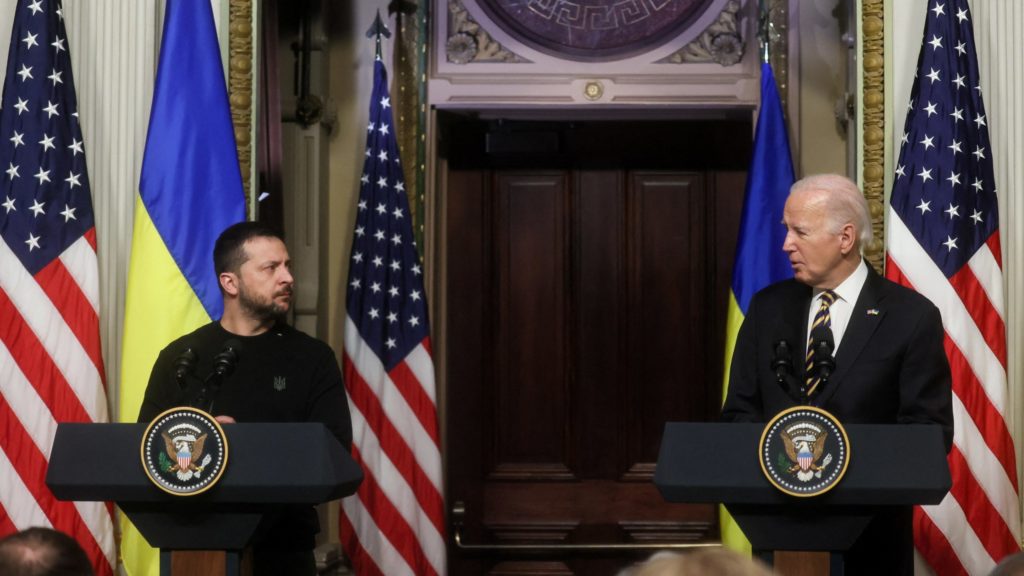The White House has signaled it is open to making some concessions to congressional Republicans on border policy in order to pass an emergency spending bill to provide billions of dollars in wartime aid to Ukraine and Israel amid their respective conflicts. Republicans have called for strict new policies at the U.S.-Mexico border, opposed by some Catholic immigration advocates, in exchange for providing the aid.
CBS News reported that the Biden administration on Dec. 12 told congressional lawmakers that it would be willing to support a new border authority to expel migrants without asylum screenings, as well as increases to the detention and deportations of migrants, in order to provide defense and humanitarian aid to the two U.S. allies.
Negotiations among lawmakers are ongoing, but the White House is seeking a deal before the end of the year, when aid to Ukraine is expected to run out as Russia intensifies its winter offensive to seize more of eastern Ukraine. Russian occupation authorities are also reported to have banned the Ukrainian Greek Catholic Church and other Catholic ministries, such as the Knights of Columbus, in Ukraine's southern Zaporizhzhia region.
"The proposals on the table, taken together, would make it virtually impossible for a person to receive protection from persecution in the U.S.," J. Kevin Appleby, senior fellow for policy at the Center for Migration Studies of New York and the former director of migration policy for the U.S. Conference of Catholic Bishops, told OSV News.
"Many lives would be placed in jeopardy by these changes," Appleby said. "If he agrees to these draconian proposals, Biden would risk a backlash from his base, especially from the Hispanic community. Any perceived political gain he sees could be negated, because he would alienate core constituencies."
"These proposals are clearly an overreach," he said. "In fact, there is no guarantee that they would significantly stem the flow of migrants, as the forces pushing people to flee, such as endemic poverty or the threat of harm, are always stronger than deterrence policies."
Appleby said the U.S. Catholic bishops "should be alarmed by these proposals, as they would adversely impact members of their flock and threaten human rights and dignity, values which are at the core of Catholic teaching."
Chieko Noguchi, a spokesperson for the USCCB, told OSV News the U.S. bishops "have long called for a comprehensive reform of our immigration system, while consistently recognizing the need to consider the potential impact of legislative changes on human life and dignity."
"The border loses, migrants lose, the country and its moral fabric loses," Dylan Corbett, executive director of Hope Border Institute, said in a statement regarding the potential concessions the White House indicated its willingness to make.
"This is an abdication of American leadership at a precarious time of worldwide migration," he said. "Under no circumstances should core international protections for the vulnerable be bartered away."
In a joint press conference Dec. 12, President Joe Biden and Ukraine President Volodymyr Zelenskyy argued in favor of the aid. Ukrainian troops on the battlefield have told Western media that ammunition is running low, requiring rationing, as Russia pours more soldiers into its current offensive to take the fortified town of Avdiivka and then Ukraine's entire Donetsk region.
"We'll continue to supply Ukraine with critical weapons and equipment as long as we can, including $200 million I just approved today in a critical needed equipment: additional air-defense interceptors, artillery, and ammunition," Biden said. "But without supplemental funding, we're rapidly coming to an end of our ability to help Ukraine respond to the urgent operational demands that it has.
Biden argued that Russian President Vladimir Putin "is banking on the United States failing to deliver for Ukraine."
"We must, we must, we must prove him wrong," Biden said.
Zelenskyy said "American leadership is crucial" to his country's cause.
"It's keeping this unity together -- a unity that serves the entire free world," Zelenskyy said. "And I thank America for (the) new sanctions. And today, we discussed Putin's further isolation and making him pay for his aggression. It's very important that, by the end of this year, we can send (a) very strong signal of our unity to the aggressor and the unity of Ukraine, America, Europe, (and) the entire free world."

